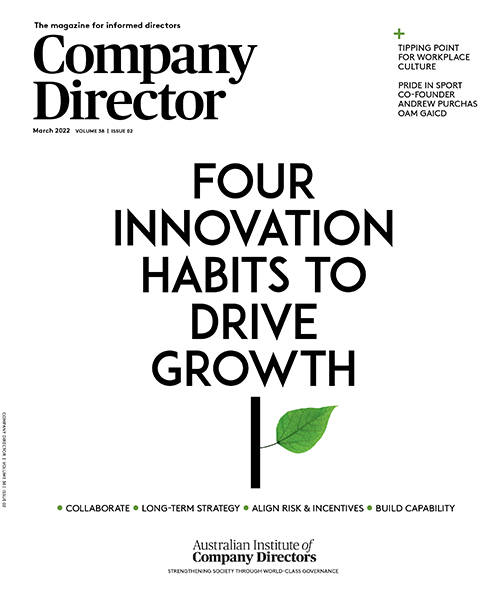Developments in the Australian economy require rethinking decisions around investment and capital allocation.
Strong jobs growth, unemployment heading towards the milestone of four per cent, household and business balance sheets generally in good shape and wages growth picking up — the Australian economy weathered the past two years of the pandemic much better than expected, noted Reserve Bank Governor Philip Lowe in February. But the turn in circumstances, which brings lurking inflation risk, “is a reminder of the difficulty of economic forecasting in a pandemic”.
However, rising inflation and the end of accommodating monetary policy are just the start of the more challenging circumstances that will shape investment decisions in 2022–23, according to Australian sovereign investor the Future Fund. In the $204b fund’s portfolio update to 31 December 2021, chair Peter Costello AC warned of the substantial adjustment ahead.
“Money will be significantly more expensive over the year or so to come and you would expect that asset prices would be affected,” he said. “We would expect you’ll see a lot of adjustment, a lot of recalibration as a consequence of rising interest rates and the ending of what were exceptionally easy monetary conditions... which means we have to position for more challenging times.”
The COVID-19 pandemic has accelerated a number of changes that had been developing in the investment environment for some time. Other shifts were catalysed by the pandemic as markets, economies and populations were disrupted, says the Future Fund’s recent white paper, A New Investment Order. It identifies 10 themes, ranging from the impact of deglobalisation, growing populism and generational wealth divides to growing costs of climate risk, change in fair values and the decline of sovereign bond duration.
“We believe that the investment thinking that has delivered strong returns over recent decades needs to be revisited,” the report says. “A new approach that tests long-held assumptions and questions the conventional wisdom that has guided institutional investors over recent decades.”
It outlined important themes affecting business, including:
Climate change
Physical climate risk has become more severe. Insured losses from natural disasters have increased from around US$10b a year in the 1980s to US$45b in the past decade (inflation-adjusted). “Direct overall losses have been four times the size of insured losses and have increased approximately threefold in the last 30 years,” the report says. “Companies with carbon-intensive operations and value chains are potentially vulnerable to market repricing.”
Corporate earnings
Since 1990, businesses have been capturing a rising share of total economic income. In the US, corporate earnings have increased from around five per cent of GDP in 1990 to 8–10 per cent today. This has been driven by the use of technology and innovation to drive productivity improvements from intangible assets, capital-friendly tax arrangements allowing forum shopping, restructuring, offshoring and automation, which has reduced costs.
“If these trends come to an end, or reverse — perhaps as a result of deglobalisation and populism — and without new sources of growth, we can expect downward pressure on earnings and equity returns in the decades ahead,” the report says.
Inflation
Developed market economies have experienced disinflation over the past four decades. The forces that have brought inflation under control have ebbed or are now in reverse so that a disinflationary structural backdrop is likely reversing again. The response to the financial crisis of 2008 and to the more recent pandemic have added to government debt burdens. “Fiscal stimulation has added to burgeoning entitlements, which can only be met by pro-inflationary policy,” the report notes.
Change in fair values
“As monetary policy reaches its limits, and technological disruption provides scale with its low capital expenditure requirements, the traditional economic cycle is under threat and traditional metrics for assessing fair value are being challenged,” the report says.
The Future Fund reported a 19.1 per cent annual return (against a target of 7.5 per cent) with a 10-year return of 10.8 per cent per year (against 6.2 per cent). Total funds under management are now at $252b.

Carbon offset upset
The governance and integrity of carbon credits is under scrutiny with the federal government announcement in December of a review of the eligible offsets for Commonwealth certifications.
This follows research from the Australia Institute Climate and Energy Program and the Australian Conservation Foundation, which found that “one in five carbon credits issued by the federal government’s $4.5b Emission Reduction Fund do not represent real abatement and are essentially ‘junk’ credits. The review will be conducted by the Climate Change Authority, chaired by former Origin Energy CEO and BCA president Grant King FAICD.
Fraud focus
20% of Australian businesses say they’ve experienced a significant fraud in the past 18 months (up from 16% in 2020) compared to 11% of other developed countries
38% said unethical behaviour is tolerated in their organisation if the people involved are senior or high-performers
45% did not report misconduct due to concerns it could impact their career progression (compared to 30% in developed countries)
64% said they felt pressure not to report misconduct (up from 43% in 2020)
36% rise in whistleblowing complaints in Australia (up from 28% in 2020)
85% said standards of behaviour employees expect from management has risen significantly (up from 74% in 2020)
Latest news
Already a member?
Login to view this content


